Your Cart is Empty
Menu

Electric Bike Throttles: Twist Vs Thumb - Which Is Best?
July 23, 2025

Electric bikes blend traditional cycling with electric power, andthe type of throttle they use plays a crucial role in how they are controlled. The two main types are twist throttles and thumb throttles. Each has its advantages and affects how you interact with the bike. How do you know which one’s for you?
Key Takeaways:
-
The best throttle type depends on your riding style and preference. Twist throttles offer precise, intuitive control, while thumb throttles provide greater comfort and ease, especially for riders with wrist issues or on rough terrain.
-
Modern throttles work with smart bike features, but installing or swapping them may require professional help.
-
Changing or upgrading throttles requires ensuring compatibility with your e-bike’s motor and controller, and improper installation can risk damage or void warranties.
This article explores the differences between these throttle types, focusing on their design, ease of use, and how they influence the riding experience. Whether you're considering an e-bike for daily commuting or outdoor adventures, understanding these differences can help you make a more informed decision.
What is a Throttle on an Electric Bike?
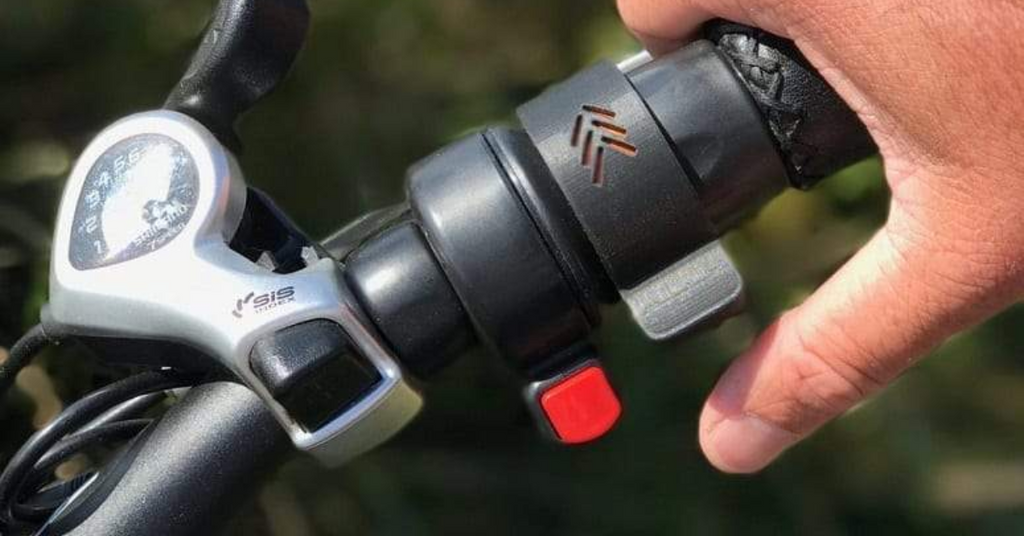
There are three common types of throttles you will see on e-bikes:
- thumb throttles
- full-twist throttles
- half-twist throttles
The benefit of throttles is that they allow you to use the motor to propel your ebike without requiring pedaling. They are common on most e-bikes today and work seamlessly with the pedal assist system and regular gears.
As the name suggests, thumb throttles are operated using your thumb, where you push down on a small, spring-loaded thumb-size paddle to engage the motor. The more you push down, the faster the bike will go.
Twist throttles, including the full hand grip or half the grip, are twisted downward to activate the motor, similar to throttles you find on scooters and motorcycles.
Each of these types of throttles has pros and cons, of course, and the real question is which throttle type is right for you. Since choosing throttles is a personal question, you must weigh those pros and cons to see what fits you best.
Understanding Thumb Throttles
A thumb throttle is a control on electric bikes that lets you use your thumb to adjust the motor's power. You press a small lever on the handlebar to go faster and release to slow down. This makes it easy to control the bike's speed without pedaling.
Here’s a closer look at its advantages and disadvantages:
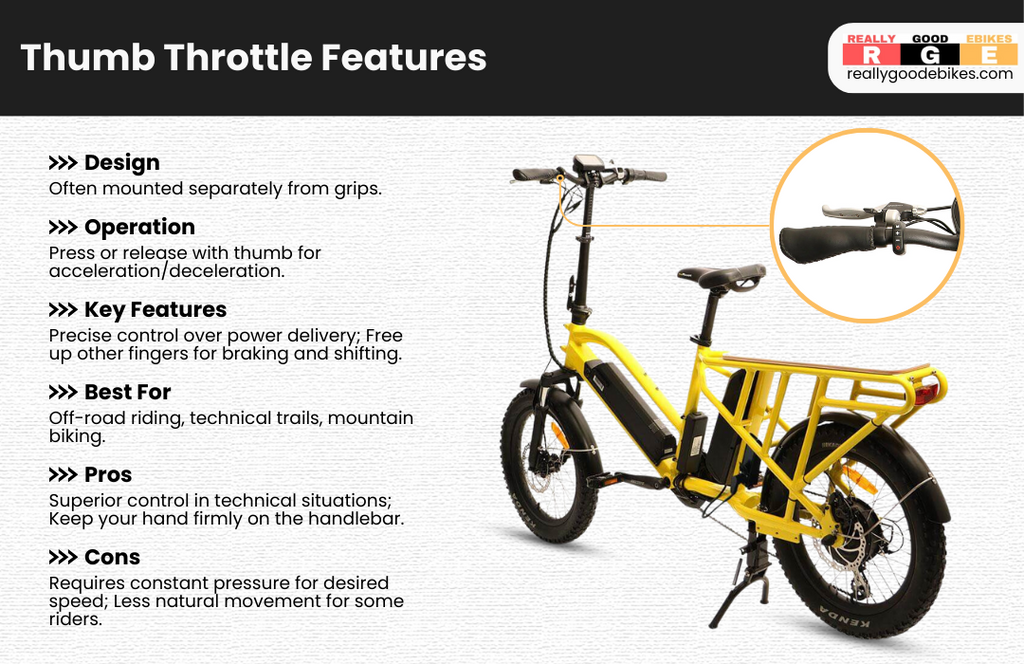
Deciding between twist and thumb throttles? Explore ourthumb throttle e-bike collection today and find the perfect ride that puts control at your fingertips.
Understanding Twist Throttles
Twist throttles are controls on electric bikes and motorcycles that let you adjust the motor's power by twisting a grip on the handlebar. Twisting it towards you speeds up the bike, and twisting it away slows it down. This makes it easy and intuitive to control your speed.
Below are the pros and cons of twist throttles:
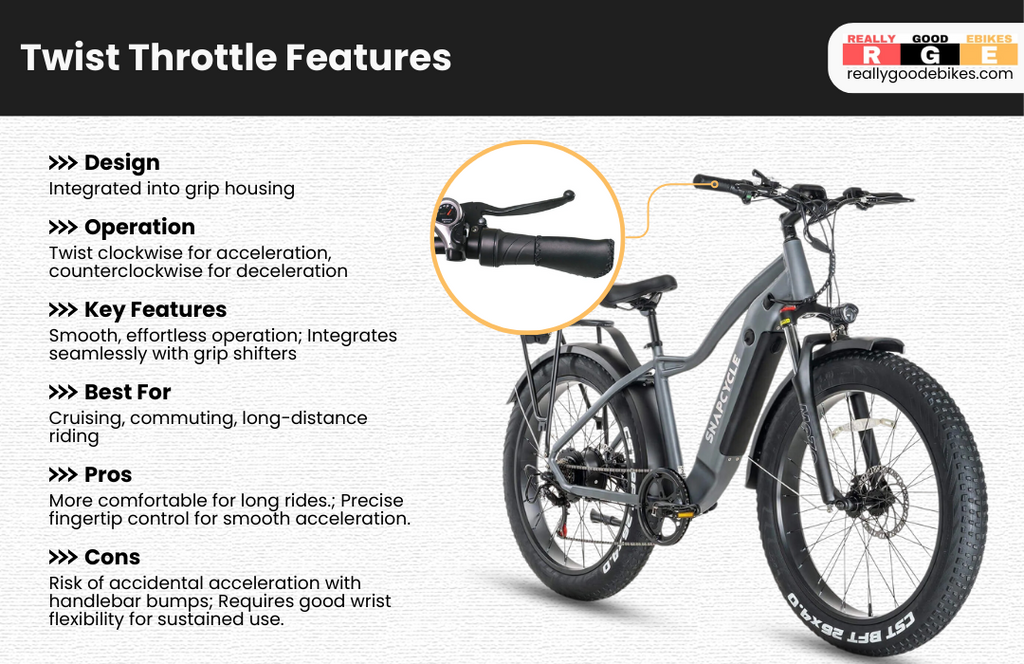
Comparative Analysis: Twist vs. Thumb Throttles
Many e-bike riders appreciate the advantages of a half-twist throttle. Unlike a conventional thumb throttle, this design allows the rider to twist the throttle and then maintain a firm grip on the handlebar with their other fingers. This functions like a simple cruise control, easing wrist fatigue because the rider primarily uses their existing grip on the handlebars for stability.
While both thumb throttles and full-twist throttles are common, some riders find the twisting sensation of a full-twist throttle less intuitive. A half-twist design offers a balance between the two.
Traditionally, throttles are placed on the right side of the handlebars, a convention borrowed from motorcycles and mopeds. However, with the addition of shifters for gears, some manufacturers have started placing throttles on the left side of the bike to avoid handlebar crowding.
This placement shift can be a matter of preference. Riders accustomed to motorcycles and mopeds often find the right-side throttle placement more intuitive and natural.
How to Choose Between Twist and Thumb Throttle
Several factors come into play when selecting the right throttle for your electric bike (e-bike). Understanding these factors can help you make an informed decision that matches your riding style, physical abilities, and personal preferences.
Riding Style
Your riding style greatly influences which throttle type is best for you. A twist throttle might be ideal if you enjoy fast rides and quick acceleration. However, a thumb throttle could be a better choice if you need more precise speed control, especially on challenging terrain, as it allows for finer adjustments.
Here’s a terrain-throttle suitability chart comparing twist vs. thumb throttles across different riding environments.

Hand Strength
Another important factor is your hand strength. Twist throttles involve rotating your wrist to accelerate, which can be difficult for those with weaker grip strength or arthritis. On the other hand, thumb throttles are easier to operate using just your thumb, requiring less force and making them more suitable for people with limited hand strength. A thumb throttle might offer a more comfortable riding experience if you're worried about hand fatigue or discomfort.
Personal Preference
Choosing between twist and thumb throttles often comes down to personal preference. Some riders find the twisting motion of a twist throttle to be natural and intuitive, while others prefer the simplicity and familiarity of a thumb throttle. To see which one feels better, consider test-riding electric bikes equipped with both throttles.
Specific Needs
Think about any specific needs or requirements that might influence your choice of throttle. For example, if you use your e-bike mainly for commuting in stop-and-go traffic, a thumb throttle might be more convenient for quick starts and stops. Alternatively, if you have a disability or mobility issue that makes operating a twist throttle difficult, a thumb throttle could be a more practical choice.
If you're still having a hard time choosing, here's a guide you can use as reference:
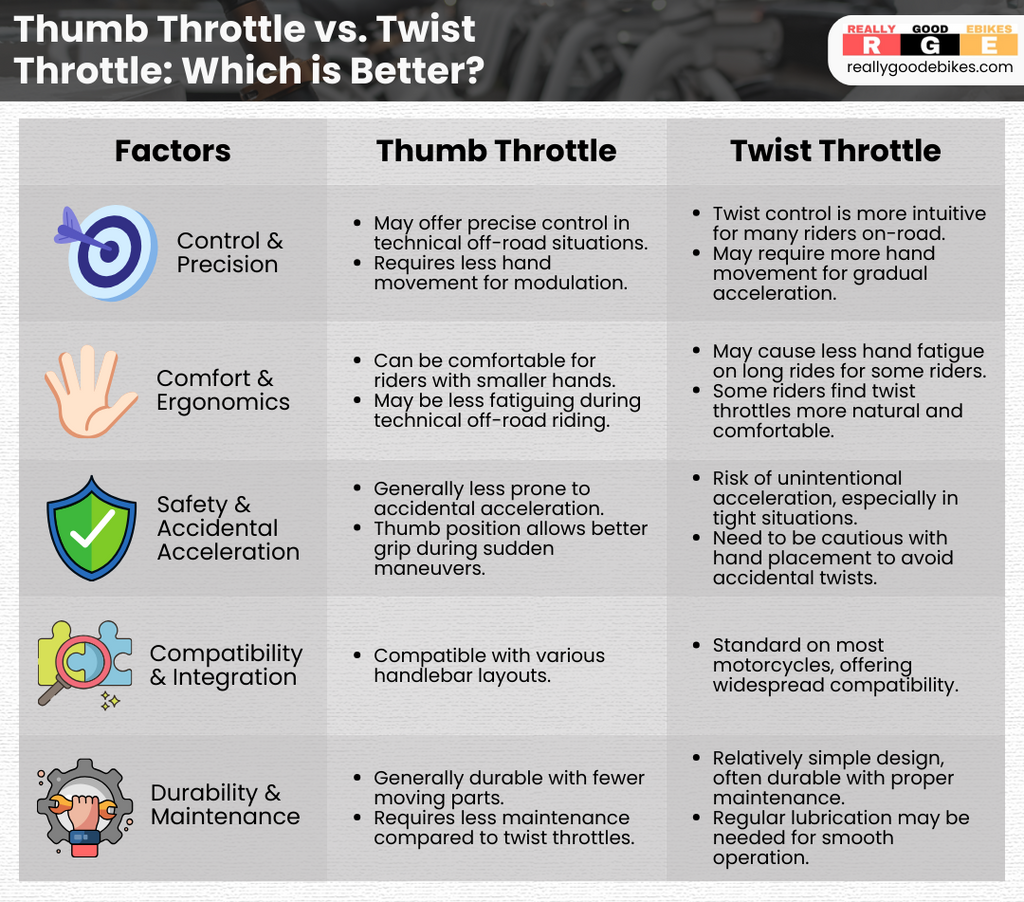
The Role of Hand Mobility and Health Considerations
Hand mobility plays a big role in choosing the right throttle type for your e-bike. If using the throttle feels uncomfortable or strains your wrist, it can take away from the fun and ease of riding. That’s why it’s important to match the throttle style to your hand strength and flexibility.
Twist throttles require more wrist movement, which can be tough for riders witharthritis or limited range of motion. Thumb throttles, on the other hand, use a small lever that’s easier to press and doesn’t rely much on wrist action, making them a more comfortable option for those with conditions like carpal tunnel or joint pain.
Installation and Customization
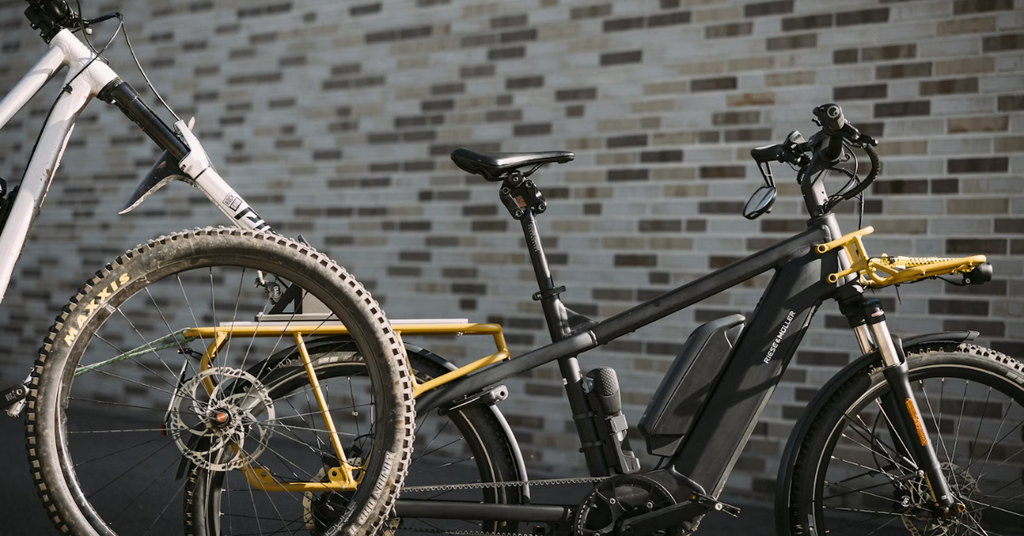
Most e-bikes come with a twist or thumb throttle, but some riders might want to customize their bike. However, changing an e-bike's electrical system can be risky. If not done correctly, it can cause malfunctions, safety risks, and might void your warranty. It's important to consider your skills and comfort with DIY projects before you start any throttle installations or modifications.
If you're comfortable working on your e-bike, here's a general overview of the process for adding or switching throttles:
- Gather Information: Identify your e-bike's motor type, controller compatibility, and existing wiring configuration. Consult your e-bike's user manual or manufacturer's website for specific details.
- Choose the Right Throttle: Ensure the new throttle is compatible with your e-bike's motor and controller. Many online retailers offer throttle replacements designed explicitly for popular e-bike models.
- Disassemble the Existing Throttle: Carefully remove the existing throttle, taking note of the wiring connections. Label the wires if necessary to ensure proper reattachment during installation.
- Install the New Throttle: Connect the new throttle's wires to the corresponding connections on your e-bike's controller, following the color coding or any specific instructions provided with the new throttle.
- Test and Adjust:Once everything is connected, power on your e-bike and test the throttle functionality. Some throttles may require adjustments within the e-bike's controller settings to ensure proper operation.
Important Considerations:
- Matching Compatibility: Double-check the compatibility of the new throttle with your specific e-bike model, motor type, and controller. Forcing an incompatible throttle can damage your e-bike's electrical system.
- Wiring Complexity:The complexity of the wiring process can vary depending on your e-bike's model. If you're unsure about handling the electrical connections, seek professional help from an e-bike mechanic.
- Warranty Implications: Modifying your e-bike's components can potentially void your warranty. Check with your e-bike manufacturer before attempting any DIY throttle installations.
While DIY throttle replacements might not be for everyone, there are readily available accessories that can enhance your throttle experience without altering the core electrical system:
- Ergonomic Grips
- Throttle Covers
- Cruise Control Attachments (if compatible)
Integrating Throttles with Modern E-Bike Features

Throttles on modern e-bikes are far more than simple on/off switches; they are sophisticated components deeply integrated into the bike's overall control system. A prime example of this is their interaction with pedal-assist (PAS) levels. While PAS provides power proportional to your pedaling, throttles offer immediate, on-demand acceleration, allowing riders to effortlessly overcome steep inclines, quickly accelerate from a standstill at an intersection, or simply cruise without pedaling when desired.
Furthermore, the integration extends to the e-bike's display and smart features. Modern throttles often communicate directly with the e-bike's display, showing real-time power output, battery consumption, or even diagnostic information. In advanced systems, throttles can be programmable via companion smartphone apps, allowing riders to customize their maximum speed, acceleration curve, or even create unique riding profiles.
Final Verdict
So, twist or thumb throttle? Ultimately, the best choice depends on your riding preferences.
A twist throttle might be ideal if you prioritize precise control and a familiar feel (like a motorcycle). A thumb throttle could be the winner for those who value comfort, ease of use, and more handlebar space.
If you still need to decide, consider trying both options on a test ride or see if a bike offers a combination throttle for the ultimate flexibility. Remember to factor in any local regulations regarding throttle types for e-bikes.
Frequently Asked Questions (FAQs)
Can I modify my e-bike's throttle myself?
While some riders are comfortable performing DIY throttle installations, it's crucial to prioritize safety. Improper installation can damage your e-bike's electrical system and void your warranty. If you need more clarification about your technical expertise, consult a qualified e-bike mechanic to ensure a safe and proper throttle modification.
Are there any legal considerations regarding e-bike throttles?
E-bike regulations can vary depending on your location. Familiarizing yourself with local laws regarding e-bike throttle types, motor wattage limitations, and speed restrictions is essential. Some regions might have specific regulations on throttle operation (e.g., twist vs. thumb throttle) or require throttle limitations to comply with e-bike classifications.
What if I have pre-existing hand limitations? Can I still ride an e-bike?
Absolutely! E-bikes can be a fantastic way for riders with various hand limitations to get around. Thumb throttles are generally easier to operate and require less grip strength than twist throttles. Additionally, ergonomic grips and handlebar adjustments can significantly improve comfort and control for all riders.
Does the throttle type affect my e-bike's battery range or motor lifespan?
While thetype of throttle (twist vs. thumb) itself doesn't directly affect battery range or motor lifespan, yourusage of it absolutely does. Relying heavily on the throttle, especially at higher power outputs and sustained speeds, will significantly drain your battery faster than if you primarily use pedal assist.
Which throttle type is better for cold weather or gloves?
Thumb throttles are generally better suited for cold weather or when riding with gloves. Since they rely on a simple pushing motion using your thumb, they’re easier to operate even with bulky winter gloves. Twist throttles, on the other hand, can be harder to grip and turn smoothly when your hands are cold or covered.
5 Responses

Jeff
September 28, 2023
Good article. I only found it because I bought my daughter an ebike which has a left thumb throttle. My ebike has a right half twist, which I feel is way better (I also ride motorcycles). I reckon I will let her decide, but there are tons of options if she wants me to switch it out. Only 15 bucks on amazon if she wants to go twist like mine. \\
Also, good idea above, switching it to right thumb inverted. Again, we’ll see what she says. Peace!!

Paul C
October 21, 2021
Excellent article, and I’m not saying that just because I like half-twist throttles! I find half-twist throttles easier to modulate than thumb throttles, even though the amount of travel is often the same. On mountain bike trails, hitting roots make my thumb bounce off thumb throttles, and cause unwanted movement with full-twist throttles. Half-twist lets me hang on firmly, and I can still control the throttle with surgical precision. And you are correct: The left side is just wrong!

Robert Kaulfuss
August 19, 2021
I completely agree with you about preferring the half-twist on the right. The problem is that there are very few bikes with this setup. I have owned many ebikes and most have the trigger on the left. I have taken to moving the trigger throttle to the right and then rotating it up so that the trigger is vertical. It then becomes easy to push forward. It can get a little crowded with the shift and brake levers, but I have managed to get everything to line up and work seamlessly. I still would prefer the half twist for the ease of modulation as you describe. Volton now has one with torque assist that I am about to order.

Al
August 04, 2021
Very helpful and I appreciated you sharing your experience and knowledge with us newbies.
Leave a comment
Comments will be approved before showing up.
Also in Really Good Ebikes: Electric Bike Blog
Your are successfully subscribed for email notifications.
Notify me when available
We will send you a notification as soon as this product is available again.
Your email is required
We don't share your email with anybody
x



Russell Bateman
October 31, 2025
I love the half twist on my 20" fat tire bike so much i converted the thumb throttle on my 16" folding bike to a half twist. The level of throttle control you get with a good quality half twist is second to none. I found the thumb throttle on my folding bike was extremely clunky in comparison.